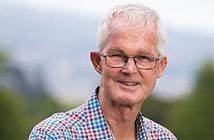The awards keep coming for a Waikato firm that has a growing presence in China and is eyeing Latin America for its natural health products.
Quantec has taken out the supreme award at the annual Natural Health Products NZ awards for the second year in a row, also adding the Cawthron Institute Innovation award.
It won with a nutraceutical that combines flaxseed oil with bioactive dairy protein.
Milk Protein & Flaxseed Oil Laitap quickly sold out its first 90,000 run in China, and a second run will soon be ready to go.
Established in 2009, Quantec specialises in extracting high-value bioactives from natural ingredients which are developed into proprietary formulations for use in human and animal products. Its patented IDP product is used by its customers to make products such as dietary health supplements and skincare products.
Winning the awards in March was welcome recognition from peers that the 10-year-old company is on the right path, says chief executive Raewyn McPhillips.
“We are a company that tries to do new and innovative things with bioactive proteins. We don’t take the well-worn path.”
That also sees Quantec as one of a handful of New Zealand firms to establish a wholly foreign owned enterprise in China.
Innovation director and company cofounder Rod Claycomb said they took the move to have more control of their distribution chain in China. Its head office is in the city of Hangzhou, a centre for medical research about an hour by train from Shanghai.
Quantec launched Milk Protein & Flaxseed Oil in China six months ago. Claycomb said they had seen a gap in the market for a supplement that not only helped gut health, but also assisted cognitive development via omega-3.
“The Chinese have long viewed the gut as the body’s second brain. IDP has always been about gut health – we added omega 3 flaxseed oil and positioned it as a product for both brains. I think in China that’s what’s really resonating with the market,” Claycomb said.
He said one of the challenges was working out how to incorporate aqueous milk powder into an oil emulsion, a process that proved more difficult than they expected.
“To even [get them to]stay in solution together took a huge amount of work, and the packaging itself is innovative, working with customers around what they wanted,” he said.
“By the end of the process we finished up with a patent file on the process of that oil emulsion/aqueous powder. So we see now the technology that we’ve developed in that product being a platform for other oil supplements.”
The final product represents a triumph of collaboration, with seven other New Zealand firms involved at various stages of its development.
McPhillips says China is an enormous and growing market for Quantec. “We’re particularly in the young children range, but know IDP is equally good for gut health and immunity for adults.”
The company will also soon launch its Epiology acne treatment there.
Epiology, which contains IDP, is currently distributed in New Zealand and Mexico. Rollouts are underway in other Latin American countries as well.
In New Zealand, the product is sold through pharmacies, while in Latin America dermatologists will be the conduit.
The New Zealand market is important to them for two reasons, McPhillips says.
“One is that we’ve got a product that we know works clinically and so we want to support our own community of people who suffer from acne. We wouldn’t want to have something that we weren’t supporting New Zealand with.
“But also, for external markets, they often want to know how well you’re doing in your own market – that’s one of the many questions we are often asked.”
“China more than anywhere,” Claycomb says. “They buy products because non-Chinese companies believe in them and they want to see that.”
Quantec’s seven staff occupy a modest office and laboratory at Innovation Park. Their model has been based on contracting out both
manufacturing and distribution, while Quantec focuses on the research and development.
McPhillips was appointed as its inaugural chief executive last year, as the company eyed continuing growth.
“We’ve pretty much doubled our turnover year on year for the last three years,” Claycomb said. “We’re hoping to do that for a few more years.”
Tips for China
Quantec has taken 10 years to build up its China market, one that continues to be enormously promising with its growing middle class.
What are their tips for doing business there?
Claycomb: “No 1, appreciate them. I think a lot of companies go in there seeing an opportunity for themselves without viewing the mutual opportunity. China is very relational – you’ve got to build a relationship first before you will be trusted in business.”
McPhillips makes the point that it is about working in China’s culture. One of their Hamilton staff members speaks Chinese, as does general manager of China operations Kirin Tsuei, who was appointed in Hangzhou last year. “He comes everywhere with us.”
Claycomb: “You’ve got to have someone in-house that you trust that understands the difference in the cultures. It’s that relational thing in China where your supply chains aren’t necessarily linear – it’s like a group of like-minded people coming together to do business.”
Secondly, he says, with every question you have, ask it over and over again to different people. “China has very western rules and structures around things like company formations – it’s not so different from here, really. But those formalities don’t often filter down through society, so you get one person telling you it works this way and then another person telling you it works another way. They’re not lying to you they just understand it in a different way. and you have to keep re-asking questions over and over and over, and constantly checking the information you’re getting.”
And thirdly, Claycomb and McPhillips say to engage with organisations like NZTE. “They have been phenomenal in their support and guidance with us, both in China and as we’re moving to Mexico. New Zealand does that so well.”




